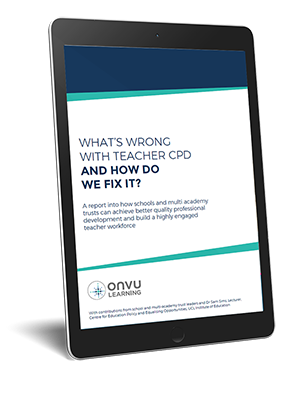- Teacher Professional Development
- 5 Minute Read



In the landscape of UK education, school leaders face a multitude of challenges, from improving and maintaining high standards of teaching and learning to navigating through systemic pressures for high student outcomes.
The IPPR report, "Improvement Through Empowerment," delves into these challenges and outlines a pathway towards a more empowered, evidence-based approach to school improvement. This blog distils key insights from the report, aimed at headteachers, school leaders, and Multi Academy Trust leaders, to guide them towards better schooling practices and improved school performance.
The IPPR report offers a critical analysis of the challenges inherent in a top-down methodology for school improvement. This approach, rooted in New Public Management (NPM) theories, has been broadly applied to public services with the belief that targets and competition could resolve issues of inefficiency and lack of innovation. However, the report underscores the shortcomings of this approach in the educational sector, particularly in elevating schools from "good enough" to consistently great.
It suggests that while targets and high-stakes accountability can motivate initial improvements, they fall short in fostering a long-term pathway to excellence. Furthermore, the report highlights the shift in the broader public service reform discourse, from low trust, skill, and autonomy environments to those characterised by high trust, skill, and autonomy. This shift not only promises to elevate school performance but also aligns with broader goals of educational equity and the well-being of educators.
In the context of lesson observations, this means moving away from using observations as a tool for judgment and towards using them or better alternatives as a foundation for development and collaborative improvement. Current approaches to lesson observations are challenged and addressed in our inaugural blog on the IPPR report: Transforming Lesson Observations
The Association of School and College Leaders (ASCL) highlights a critical issue within the current inspection framework: schools judged as less than good often find themselves deprived of the necessary support to improve. This situation is exacerbated by the stigma attached to these grades, which can deter skilled teachers and leaders from joining schools that need them the most. This dynamic contributes to a vicious cycle where schools struggle to break free from poor performance due to a lack of resources and support.
The report adds:
"A grade of anything less than good can also act as a red flag when recruiting, making it harder to find skilled teachers and leaders willing to work in the schools that need them most".
This insight underlines the unintended consequences of the inspection system, which not only fails to provide a roadmap for improvement but also isolates schools from the potential talent that could catalyse positive change. Despite the purpose of an inspection system to provide insight and assurance to parents, the impact on teachers themselves needs far greater attention.
On the other end of the spectrum, schools with 'outstanding' grades face immense pressure to maintain their status. This pressure can lead to a narrow focus on preserving the 'gold star', potentially at the expense of addressing the unique needs of their community. Similarly, 'good' schools might pursue an 'outstanding' grade with such fervour that it diverts their attention from more pressing, community-specific issues. This phenomenon indicates a misalignment between the incentives created by the inspection system and the broader educational goals of serving the diverse needs of school communities.
A central theme of the report is the critical role of teacher empowerment in driving school improvement. The report notes the insufficiency of bespoke professional development opportunities compared to other OECD countries, underlining the need for a system that supports teachers' continuous learning and career development.
The report points out that:
"While NPQs provide valuable gold-standard provision, there is a risk they might become a one-size-fits-all professional qualification"
This underscores the need for professional development that is tailored to the individual needs of teachers at different stages of their careers. This tailored approach is essential for ensuring that all teachers have access to development opportunities that meet their specific needs and aspirations.
Further reading: Personalising CPD in Schools
The report makes several key policy recommendations aimed at enhancing the educational landscape:
The report calls for the elimination of single-word inspection judgements, advocating for a more nuanced, area-specific approach to evaluations. This shift is intended to avoid the negative consequences associated with current assessments and promote a more constructive and supportive inspection process. It suggests a model where schools are empowered with precise insights and feedback that actively promotes improvement.
The report advocates for a shift towards evidence-informed practices that empower teachers and schools to innovate and improve. Insights from ASCL suggest a re-evaluation of the current inspection and accountability mechanisms. By shifting the focus from summative measures to supportive, evidence-informed practices, the education system can create an environment where schools at all levels of performance feel empowered to improve based on their unique contexts and challenges. It proposes a clearer distinction between the roles of the inspectorate and the regulator.

A key recommendation is the adoption of tailored school improvement strategies that allow for differentiation and specificity in addressing schools' unique needs. This approach effectively summarises the context of most recommendations and emphasises the importance of autonomy and the need for schools to lead their own development initiatives.
Further reading: Personalising CPD in Schools
The use of 360-degree video lesson capture technology emerges as a pivotal solution in this context. By providing educators with a comprehensive view of their teaching it allows for a more detailed and authentic assessment of teaching practices and their impact on every student, aligning with the report's emphasis on 'school-led development' as a means of pursuing continuous improvement. Fostering an environment of self-reflection and targeted improvement are integral to the school’s culture.
This technology can help break the cycle of poor performance by enabling targeted support and professional growth, irrespective of a school's current grade.
Moreover, for schools striving to maintain or achieve higher grades, this technology offers a way to balance the pursuit of excellence with the need to respond to community needs. By providing detailed insights into classroom practices, schools can identify areas for improvement that align with their educational goals, rather than focusing solely on external benchmarks.
In terms of 'enhanced support', ONVU Learning’s detailed insights into classroom dynamics can be invaluable. The technology aids schools in developing and implementing nuanced and effective school improvement plans, aligning with the report's call for regional directors to:
“Identify any cold spots in their region and support the development of additional high-quality support where necessary”.
This ensures that support is not only available but is also tailored to the specific needs of each teacher and school.
For situations that require 'immediate action', ONVU Learning can provide rapid, evidence-based insights, helping schools to quickly identify and address critical areas of concern. This aligns with the report's recommendation for a regulatory response that is swift and effective, ensuring that the right leadership is trusted and supported to make necessary improvements.
The IPPR report and ASCL's commentaries bring to light the essential need for advanced, contextualised and supportive school improvement strategies.
Envisioning a revamped role for inspections and leveraging innovative technologies like ONVU Learning, the UK educational framework can evolve into a setting that is more just, adaptable, and empowering for every school. This transformation not only aims to enhance school performance but also guarantees that the process of improvement is considerate of the diverse needs present in schools across the nation.
In the realm of these enhanced school improvement strategies, ONVU Learning emerges as a critical element in revolutionising the approach to improving school standards. Providing educators with tools to observe and refine their teaching methods from various viewpoints, this technology fosters the development of an evidence-based approach within educational settings. It empowers teachers to identify precise improvement areas, engage in meaningful professional development, and play a significant role in the overall upliftment of educational quality.
This approach, which resonates with the report’s emphasis on empowerment, enables schools to devise a customised improvement plan, underpinned by evidence and driven by the specific needs and ambitions of their educators.
Did you miss our previous Insights on the IPPR "Improvement through Empowerment" Report? If so, check out:
Part 1: Transforming Lesson Observations
Part 2: Personalising CPD (Continuing Professional Development) in Schools
You can download the full Institute for Public Policy Research (IPPR),"Improvement through Empowerment" report at: https://www.ippr.org/files/2023-11/improvement-through-empowerment-nov23.pdf

An insightful and informative report exploring how schools and multi academy trusts can achieve quality professional development and build a highly engaged teacher workforce.
With contributions from influential education leaders, it’s a read you won't want to miss.
KEEP IN TOUCH WITH ONVU LEARNING AND BE THE FIRST TO RECEIVE THE LATEST NEWS AND INSIGHTS ON EDTECH, LESSON OBSERVATION, TEACHER TRAINING AND DEVELOPMENT.